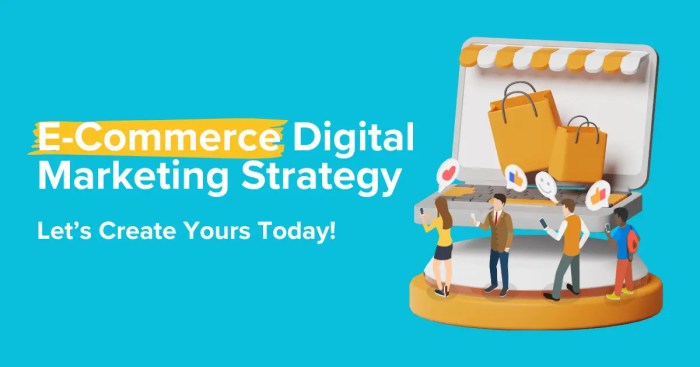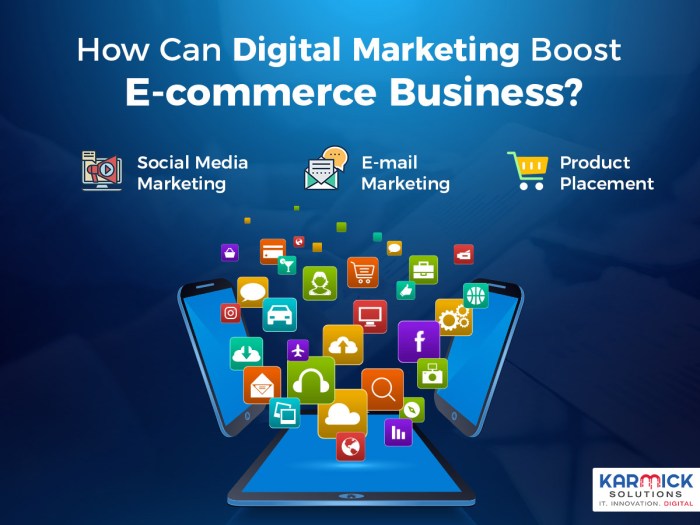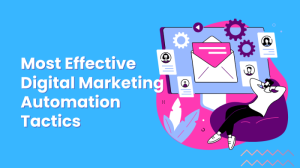
Embark on a journey through the world of digital marketing for e-commerce, where success is just a few strategies away. Get ready to revolutionize your online business!
In this guide, we will explore the ins and outs of digital marketing for e-commerce, from strategies to branding, advertising to affiliate marketing. Let’s dive in!
Digital Marketing Strategies for E-commerce
Digital marketing is crucial for the success of e-commerce businesses in today’s competitive landscape. It allows companies to reach a wider audience, increase brand visibility, drive traffic to their websites, and ultimately boost sales. Without effective digital marketing strategies, e-commerce businesses may struggle to stand out among the countless online retailers vying for consumer attention.
Comparison of Different Digital Marketing Strategies for E-commerce
There are various digital marketing strategies that e-commerce businesses can utilize to achieve their goals. Let’s compare and contrast some of the most popular ones:
- Search Engine Optimization (): involves optimizing a website’s content and structure to improve its visibility on search engines like Google. It helps e-commerce businesses rank higher in search results, driving organic traffic to their sites.
- Pay-Per-Click Advertising (PPC): PPC advertising allows e-commerce businesses to bid for ad placements on search engines and other platforms. They only pay when users click on their ads, making it a cost-effective way to drive targeted traffic.
- Social Media Marketing: Social media platforms like Facebook, Instagram, and Twitter offer e-commerce businesses a way to engage with their target audience, build brand awareness, and drive traffic to their websites through targeted ads and engaging content.
- Email Marketing: Email marketing remains a powerful tool for e-commerce businesses to nurture relationships with customers, promote products, and drive sales. Personalized and targeted email campaigns can help businesses retain customers and encourage repeat purchases.
Examples of Successful E-commerce Businesses Utilizing Digital Marketing
Several e-commerce businesses have effectively leveraged digital marketing strategies to achieve success. Here are a few notable examples:
- Amazon: Amazon is a prime example of an e-commerce giant that has mastered the art of digital marketing. Through personalized recommendations, targeted ads, and seamless user experience, Amazon has become a household name and the go-to online marketplace for millions of shoppers.
- Warby Parker: Warby Parker disrupted the eyewear industry by offering affordable, stylish glasses online. Their innovative use of social media marketing, influencer partnerships, and user-generated content has helped them build a loyal customer base and stand out in a crowded market.
- Sephora: Sephora’s digital marketing strategy includes a strong emphasis on mobile optimization, personalized recommendations, and interactive content. Their Beauty Insider loyalty program and engaging social media campaigns have helped them drive sales and foster customer loyalty.
Marketing E-commerce
Marketing in the context of e-commerce refers to the strategies and tactics used to promote and sell products or services online. It involves various digital channels such as social media, email marketing, search engine optimization (), and online advertising to reach potential customers and drive sales.Marketing plays a crucial role in driving sales and revenue for e-commerce businesses by increasing brand awareness, attracting new customers, and retaining existing ones.
Effective marketing campaigns can help businesses stand out in a crowded online marketplace, build customer loyalty, and ultimately, increase revenue.
Tips for Effective Marketing Campaigns
- Identify your target audience: Understanding your target market’s demographics, preferences, and behavior is key to creating personalized and targeted marketing campaigns.
- Optimize your website for conversions: Make sure your e-commerce website is user-friendly, visually appealing, and optimized for mobile devices to drive conversions.
- Utilize social media: Engage with your audience on platforms like Facebook, Instagram, and Twitter to build brand awareness and drive traffic to your website.
- Invest in email marketing: Use email campaigns to nurture leads, promote new products, and incentivize repeat purchases from existing customers.
- Implement best practices: Optimize your website content and product descriptions for search engines to improve your visibility and attract organic traffic.
- Run targeted online advertising campaigns: Use platforms like Google Ads and Facebook Ads to target specific audiences and drive traffic to your e-commerce site.
Advertising in E-commerce
Advertising plays a crucial role in the e-commerce industry, helping businesses reach their target audience, increase brand awareness, drive traffic to their websites, and ultimately boost sales. It allows e-commerce businesses to showcase their products or services to a wider audience and stay competitive in the market.
Different Advertising Channels and Platforms
- Search Engine Marketing (SEM): E-commerce businesses often utilize SEM to display ads on search engine results pages, targeting users actively searching for relevant products or services.
- Social Media Advertising: Platforms like Facebook, Instagram, and Twitter offer targeted advertising options to e-commerce businesses, allowing them to reach specific demographics based on interests, behaviors, and more.
- Display Advertising: Banner ads, pop-ups, and other visual advertisements placed on websites and apps can help e-commerce businesses attract the attention of potential customers.
- Email Marketing: Sending promotional emails to subscribers or customers is a common advertising strategy in e-commerce, offering personalized recommendations, discounts, and updates on new products.
Examples of Successful E-commerce Advertising Campaigns
Amazon Prime Day: Amazon’s annual sales event, Prime Day, is a massive advertising campaign that generates significant revenue for the e-commerce giant, attracting millions of shoppers with exclusive deals and offers.
Walmart’s Free Shipping: Walmart’s strategic advertising campaign promoting free shipping on orders over a certain amount helped the retail giant compete with other e-commerce businesses offering similar perks, driving sales and customer loyalty.
Zappos’ Remarketing Ads: Zappos effectively uses remarketing ads to target customers who have visited their website but did not make a purchase, reminding them of products they viewed and encouraging them to complete their purchase.
Affiliate Marketing for E-commerce

Affiliate marketing is a performance-based marketing strategy where businesses reward affiliates for driving traffic or sales to their website through the affiliate’s marketing efforts. In the e-commerce sector, affiliate marketing plays a crucial role in expanding reach and increasing sales.
Benefits of Affiliate Marketing for E-commerce Businesses
- Affiliate marketing helps e-commerce businesses reach a wider audience through the network of affiliates promoting their products or services.
- It is a cost-effective way to drive traffic and increase sales since businesses only pay affiliates for actual results obtained.
- Affiliate marketing can improve by increasing backlinks and driving more organic traffic to the e-commerce website.
- It provides an opportunity for businesses to collaborate with influencers and bloggers who can promote their products to their loyal followers.
- Affiliate marketing can help e-commerce businesses build brand credibility and trust through the endorsement of trusted affiliates.
Tips for Setting Up and Managing Affiliate Marketing Programs Effectively
- Define clear goals and objectives for the affiliate marketing program to align with the overall business strategy.
- Select affiliates that resonate with your brand and target audience to ensure effective promotion and higher conversion rates.
- Provide affiliates with marketing materials, tracking tools, and support to help them promote your products or services effectively.
- Offer competitive commission rates and incentives to motivate affiliates to drive more traffic and sales to your e-commerce website.
- Regularly monitor and analyze the performance of affiliates to optimize the program and identify top-performing partners for strategic collaborations.
Branding Strategies for E-commerce
Branding plays a crucial role in the success of e-commerce businesses. It helps create a unique identity, build trust with customers, and differentiate the brand from competitors in a crowded market.
Importance of Branding for E-commerce Businesses
Branding for e-commerce businesses is essential as it helps establish a strong presence in the digital landscape. It allows businesses to convey their values, mission, and personality to customers, creating an emotional connection that can lead to brand loyalty. A well-defined brand identity can also help attract new customers and retain existing ones by providing a consistent and memorable experience.
How Branding Helps E-commerce Businesses Stand Out
Branding can help e-commerce businesses stand out in a competitive market by establishing a unique selling proposition (USP) that differentiates them from competitors. By creating a strong brand identity, businesses can effectively communicate their value proposition to customers, making it easier for them to choose their products or services over others. Consistent branding across all touchpoints, including website, social media, and packaging, can help reinforce the brand’s message and build trust with consumers.
Examples of Successful E-commerce Brands and Their Branding Strategies
1. Warby Parker
Warby Parker is known for its affordable and stylish eyewear. The brand’s direct-to-consumer model, combined with a strong social mission to provide eyeglasses to those in need, has helped it stand out in the eyewear industry.
2. Sephora
Sephora has built a strong brand by offering a wide range of beauty products and a personalized shopping experience both online and in-store. The brand’s focus on innovation and customer engagement has made it a leader in the beauty industry.
3. Casper
Casper disrupted the mattress industry with its direct-to-consumer model and innovative mattress design. The brand’s focus on quality, comfort, and convenience has helped it become a household name in the bedding market.
4. Allbirds
Allbirds is known for its sustainable and comfortable footwear made from natural materials. The brand’s commitment to sustainability and innovation has resonated with environmentally conscious consumers, helping it carve out a niche in the footwear industry.These examples demonstrate how effective branding strategies can help e-commerce businesses succeed in a competitive market by creating a strong brand identity, communicating a unique value proposition, and building trust with customers.
Direct Marketing in E-commerce
Direct marketing involves directly communicating with potential customers to promote products or services. In the e-commerce industry, direct marketing strategies are implemented through various channels such as email marketing, social media advertising, and personalized messaging.
Application of Direct Marketing in E-commerce
Direct marketing in e-commerce is highly effective as it allows businesses to target specific customer segments with personalized messages. By utilizing customer data and behavior analytics, e-commerce companies can tailor their marketing campaigns to individual preferences, increasing the likelihood of conversion.
- Personalized Email Campaigns: Sending targeted emails based on customer preferences and purchase history can drive engagement and sales.
- Social Media Advertising: Utilizing platforms like Facebook and Instagram to deliver personalized ads to potential customers can lead to higher conversion rates.
- Retargeting Strategies: Reaching out to customers who have shown interest in a product but have not made a purchase can help in driving sales and increasing customer retention.
Direct marketing allows e-commerce businesses to establish direct communication with customers, fostering a sense of personal connection and loyalty.
Effectiveness of Direct Marketing in E-commerce
Direct marketing in e-commerce has proven to be highly effective in driving customer engagement and sales. By delivering relevant and personalized messages to customers, businesses can create a more impactful marketing experience, leading to increased brand loyalty and repeat purchases.
- Increased Customer Engagement: Direct marketing initiatives such as personalized emails and targeted ads can capture the attention of customers and encourage interaction with the brand.
- Higher Conversion Rates: By tailoring marketing messages to individual preferences, e-commerce businesses can significantly improve conversion rates and drive sales.
- Improved Customer Retention: Building relationships through direct marketing can result in higher customer retention rates and increased customer lifetime value.
Best Practices for Implementing Direct Marketing Strategies in E-commerce
To effectively implement direct marketing strategies in e-commerce businesses, it is essential to follow best practices that maximize engagement and sales opportunities.
- Segmentation and Personalization: Divide customers into segments based on behavior and preferences to deliver targeted and personalized marketing messages.
- Utilize Customer Data: Leverage customer data and analytics to understand customer behavior and create tailored marketing campaigns.
- Omnichannel Approach: Engage customers across multiple channels such as email, social media, and website to create a cohesive and integrated marketing experience.
Internet Marketing for E-commerce
Internet marketing plays a crucial role in promoting e-commerce businesses by increasing online visibility, driving traffic to websites, and ultimately boosting sales. It encompasses various strategies and techniques aimed at reaching and engaging potential customers in the digital landscape.
(Search Engine Optimization)
is the process of optimizing a website to improve its ranking in search engine results pages. By incorporating relevant s, creating quality content, and building backlinks, e-commerce businesses can enhance their online presence and attract organic traffic.
SEM (Search Engine Marketing)
SEM involves paid advertising to increase a website’s visibility in search engine results. This includes pay-per-click (PPC) campaigns, display ads, and remarketing strategies. E-commerce businesses can use SEM to target specific audiences and drive immediate traffic to their websites.
Social Media Marketing
Social media marketing focuses on leveraging social platforms to connect with customers, promote products, and build brand awareness. E-commerce businesses can engage with their target audience through content sharing, influencer partnerships, and targeted advertising on platforms like Facebook, Instagram, and Twitter.
Tips for Leveraging Internet Marketing in E-commerce
- Identify your target audience and tailor your internet marketing strategies to meet their needs and preferences.
- Create high-quality, -friendly content to improve search engine rankings and attract organic traffic.
- Utilize social media platforms to engage with customers, share valuable content, and run targeted advertising campaigns.
- Monitor and analyze key performance indicators (KPIs) to track the effectiveness of your internet marketing efforts and make data-driven decisions.
- Stay up-to-date with the latest trends and innovations in internet marketing to remain competitive in the e-commerce landscape.
Mailing Lists for E-commerce
Building and maintaining mailing lists is crucial for the success of e-commerce businesses. It allows businesses to reach out to customers directly, provide personalized offers, and keep them engaged with the brand.
Importance of Building and Maintaining Mailing Lists
- Building a mailing list helps businesses to establish a direct line of communication with customers.
- Maintaining a mailing list allows businesses to send targeted promotions and updates to interested customers.
- Regularly engaging with customers through email can lead to increased brand loyalty and repeat purchases.
Strategies for Growing and Segmenting Mailing Lists
- Offer incentives such as discounts or freebies in exchange for email sign-ups to encourage growth.
- Segment mailing lists based on customer preferences, purchase history, or demographics to send targeted and relevant content.
- Regularly clean and update mailing lists to ensure high deliverability rates and engagement.
Examples of Successful E-commerce Businesses Using Mailing Lists
- Amazon utilizes personalized email recommendations based on customer browsing and purchase history to drive sales.
- Sephora segments its mailing list to send targeted beauty tips and product recommendations to different customer segments.
- Zara offers exclusive early access to sales and new collections for customers who sign up for their mailing list.
End of Discussion

As we wrap up our exploration of digital marketing for e-commerce, remember that the key to thriving in the online business world lies in leveraging these powerful marketing techniques. So go ahead, implement what you’ve learned, and watch your e-commerce business soar to new heights!
Query Resolution
How important is digital marketing for e-commerce businesses?
Digital marketing is crucial for e-commerce businesses as it helps reach a wider audience, increase brand visibility, and drive sales.
What are some effective ways to create marketing campaigns for e-commerce?
Some effective ways include utilizing social media platforms, email marketing, influencer partnerships, and targeted advertising to reach potential customers.
How can e-commerce businesses leverage internet marketing for success?
E-commerce businesses can leverage internet marketing by focusing on strategies, running targeted SEM campaigns, and engaging with their audience through social media to increase brand awareness and drive traffic.
Why are mailing lists important for e-commerce businesses?
Mailing lists help e-commerce businesses nurture relationships with customers, promote products or services, and drive repeat purchases through targeted email campaigns.





